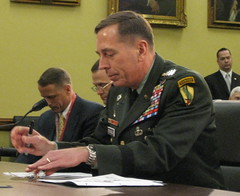Thursday
Apr302009
The Right to Defend Oneself
By Michael Ruhl, University of New Mexico – Talk Radio News Service
“We all have an inherent right to self defense in international waters,” according to Senator Jim Webb (D-VA). This remark came out of a Senate Foreign Relations Committee hearing that saw testimony from Richard Phillips, Captain of the Maersk Alabama. Phillips received international media attention several weeks ago while being held hostage by pirates off of the coast of Somalia.
Both the Senators and the witnesses acknowledged that Piracy off of the coast of Somalia has been on the rise recently. Committee Chairman John Kerry (D-Mass.) said that America’s “ability to project naval power and to help ensure the free passage of goods and humanitarian aid is as important as ever.”
Phillips acknowledged that more needs to be done to secure vessels of the merchant marine, specifically arming the crew.
“In my opinion, arming the crew cannot and should not be viewed as the best or ultimate solution to the problem. At most, arming the crew should only be one component of a comprehensive plan and approach to combat piracy,” he said.
The comprehensive approach the committee discussed could include increased U.S. Navy presence in the most dangerous areas, the creation of a protected corridor that civilian ships can travel within, the rooting out of pirates in their land based sanctuaries and the “hardening” of ships, to make the ships structurally more resistant to pirates. “Hardening” measures include razor wire on railings, fire hoses to repel the pirates, and unbolting ladders that lead onto the boat. Phillips does not believe this will stop the pirates, but rather, that they will find a way to adapt.
Maersk Chaiman John Clancey, also present at the hearing, does not believe that arming the crews is a good idea.
“Our belief is that arming merchant sailors may result in the acquisition of even more lethal weapons and tactics by the pirates, a race that merchant sailors cannot win. In addition, most ports of call will not permit the introduction of forearms into their national waters,” Clancey said.
Clancey also posed that greater liability may be assumed by the companies if sailors are traveling with weapons. Neither Chairman Kerry nor Phillips felt that this argument was strong, because of the intense amount of training that mariners go through already. Kerry, a former member of the U.S. Navy, feels that the benefits outweigh the risks, and that multinational agreements can be reached to work out the issue of bringing weapons into port.
Richard Phillips is scheduled to testify next week before the Senate Armed Services Committee.
“We all have an inherent right to self defense in international waters,” according to Senator Jim Webb (D-VA). This remark came out of a Senate Foreign Relations Committee hearing that saw testimony from Richard Phillips, Captain of the Maersk Alabama. Phillips received international media attention several weeks ago while being held hostage by pirates off of the coast of Somalia.
Both the Senators and the witnesses acknowledged that Piracy off of the coast of Somalia has been on the rise recently. Committee Chairman John Kerry (D-Mass.) said that America’s “ability to project naval power and to help ensure the free passage of goods and humanitarian aid is as important as ever.”
Phillips acknowledged that more needs to be done to secure vessels of the merchant marine, specifically arming the crew.
“In my opinion, arming the crew cannot and should not be viewed as the best or ultimate solution to the problem. At most, arming the crew should only be one component of a comprehensive plan and approach to combat piracy,” he said.
The comprehensive approach the committee discussed could include increased U.S. Navy presence in the most dangerous areas, the creation of a protected corridor that civilian ships can travel within, the rooting out of pirates in their land based sanctuaries and the “hardening” of ships, to make the ships structurally more resistant to pirates. “Hardening” measures include razor wire on railings, fire hoses to repel the pirates, and unbolting ladders that lead onto the boat. Phillips does not believe this will stop the pirates, but rather, that they will find a way to adapt.
Maersk Chaiman John Clancey, also present at the hearing, does not believe that arming the crews is a good idea.
“Our belief is that arming merchant sailors may result in the acquisition of even more lethal weapons and tactics by the pirates, a race that merchant sailors cannot win. In addition, most ports of call will not permit the introduction of forearms into their national waters,” Clancey said.
Clancey also posed that greater liability may be assumed by the companies if sailors are traveling with weapons. Neither Chairman Kerry nor Phillips felt that this argument was strong, because of the intense amount of training that mariners go through already. Kerry, a former member of the U.S. Navy, feels that the benefits outweigh the risks, and that multinational agreements can be reached to work out the issue of bringing weapons into port.
Richard Phillips is scheduled to testify next week before the Senate Armed Services Committee.
tagged  African Horn,
African Horn,  Foreign Relations,
Foreign Relations,  Free Trade,
Free Trade,  Jim Webb,
Jim Webb,  John Clancey,
John Clancey,  Maersk Alabama,
Maersk Alabama,  Marine,
Marine,  Massachusetts,
Massachusetts,  Michael Ruhl,
Michael Ruhl,  Navy,
Navy,  Piracy,
Piracy,  Richard Phillips,
Richard Phillips,  Ruhl,
Ruhl,  Somalia,
Somalia,  Trade,
Trade,  Us,
Us,  aid,
aid,  armed forces,
armed forces,  captain,
captain,  civilian,
civilian,  committee,
committee,  democrat,
democrat,  humanitarian aid,
humanitarian aid,  john kerry,
john kerry,  merchant,
merchant,  merchant marine,
merchant marine,  michael,
michael,  michael t ruhl,
michael t ruhl,  michaeltruhl,
michaeltruhl,  military,
military,  naval,
naval,  pirates,
pirates,  senate,
senate,  senate armed services committee,
senate armed services committee,  senator,
senator,  virginia in
virginia in  Congress,
Congress,  News/Commentary
News/Commentary
 African Horn,
African Horn,  Foreign Relations,
Foreign Relations,  Free Trade,
Free Trade,  Jim Webb,
Jim Webb,  John Clancey,
John Clancey,  Maersk Alabama,
Maersk Alabama,  Marine,
Marine,  Massachusetts,
Massachusetts,  Michael Ruhl,
Michael Ruhl,  Navy,
Navy,  Piracy,
Piracy,  Richard Phillips,
Richard Phillips,  Ruhl,
Ruhl,  Somalia,
Somalia,  Trade,
Trade,  Us,
Us,  aid,
aid,  armed forces,
armed forces,  captain,
captain,  civilian,
civilian,  committee,
committee,  democrat,
democrat,  humanitarian aid,
humanitarian aid,  john kerry,
john kerry,  merchant,
merchant,  merchant marine,
merchant marine,  michael,
michael,  michael t ruhl,
michael t ruhl,  michaeltruhl,
michaeltruhl,  military,
military,  naval,
naval,  pirates,
pirates,  senate,
senate,  senate armed services committee,
senate armed services committee,  senator,
senator,  virginia in
virginia in  Congress,
Congress,  News/Commentary
News/Commentary 







“The Most Dangerous Credit Card in the History of the World”
House Minority Leader John Boehner (R-Ohio)
Photo by Michael Ruhl
Boehner said that Democrat’s “record on spending and debt is staggering, but our economy is growing weaker, and it’s not going to get any better by growing the size of the government here in Washington.”
Boehner believes that the Democratically controlled Congress has enabled and contributed to the recklessness, and thinks it is up to the Republicans to put a stop to it. Republicans must be “the party of better solutions” if they are going to stand up to the Democrats in Congress, Boehner said, adding that he hopes Democrats will be committed to a bipartisan policy approach..
Citing the elections of 2008, Boehner said “out brand has been tarnished”, but to help the party serve the American people, Republicans must stand up to the Obama Administration when disagreements arise, and to offer alternative solutions.
Leader Boehner applauded President Obama on his strategy towards Afghanistan and Iraq, but showed concern at Obama’s greater national security policy.
“The big question continues to be: what is the Administration’s overarching plan to fight terrorism? Judging from their recent decision to release 30 terrorist detainees with no plan on where to put them, it continues to beg the question,” referring to Obama’s closure of the Guantanamo Bay detention center without knowing where the detainees will be sent.